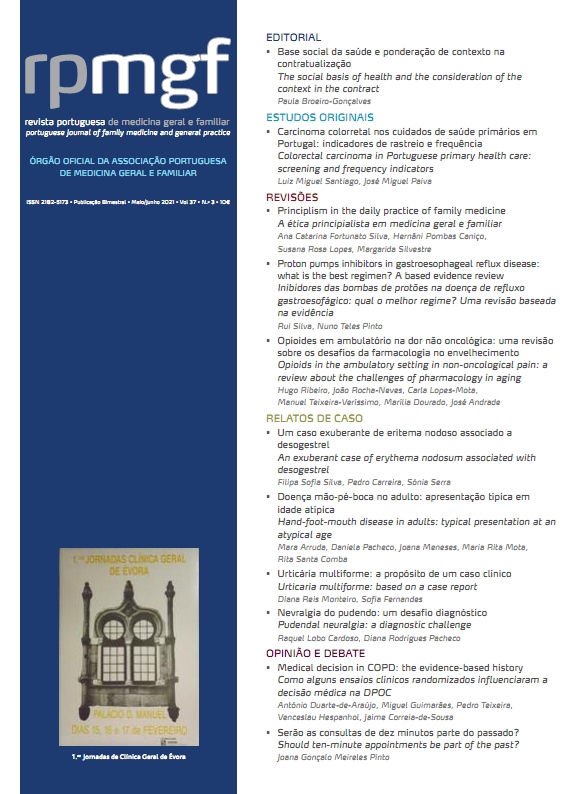Principlism in the daily practice of family medicine
DOI:
https://doi.org/10.32385/rpmgf.v37i3.12693Keywords:
Bioethics, Principlism, Beneficence, Physician-patient relationship, General practiceAbstract
Introduction: Principlism, from Tom Beauchamp and James Childress, is the most widely accepted theory in biomedical ethics. It is based on four principles: beneficence, non-maleficence, autonomy, and justice. These are part of a common moral serving general action guides to any clinician, including the family doctor. The main purposes of this review are to describe how Principlism can be applied to daily general practice and reflect on how bioethics’ principles can improve the physician-patient relationship.
Methods: We developed an integrative literature review, including conventions, declarations, treaties, textbooks, and scientific research articles. Three medical databases were selected to search through the medical literature with specific inclusion criteria. From a total of 2,352 potential articles, 161 were read and 21 were included in this review. The results were grouped into four categories: family medicine and the physician-patient relationship; respect for autonomy; non-maleficence and beneficence; and justice.
Results: Family doctors play their professional role by promoting health, preventing disease, and providing cure, care, or palliation. This area may be faced with ethical dilemmas including the moment of obtaining informed consent, medical confidentiality, disease prevention, and the choice of complementary diagnostic tests and therapeutics. All these moral dilemmas arise in the context of a single interpersonal relationship, which is possibly the most therapeutic aspect of medical consultation.
Conclusions: Despite all the technological innovation, moral conduct, and principles governing the profession of family doctors remains faithful to the principles of the FM specialty. In a context of a dehumanization threat and global discontent, it is essential to foster a growing humanization of primary health care and recover ethical values, to achieve an optimization of the physician-patient relationship, to deepen the level of understanding of "patient's needs and values" and finally to meet their expectations.
Downloads
Downloads
Published
Issue
Section
License
The authors will assign to the RPMGF the sole right to publish and distribute the content of the manuscript specified in this declaration via physical, electronic, broadcasting or any other medium that may come into existence. They also grant the RPMGF the right to use and exploit this manuscript, in particular by assigning, selling or licensing its content. This permission is permanent and takes effect from the moment the manuscript is submitted, has the maximum duration allowed by applicable Portuguese or international law and is of worldwide scope. The authors further declare that this assignment is made free of charge. If the RPMGF informs the authors that it is not going to publish their manuscript, the exclusive assignment of rights ceases forthwith.
The authors authorise the RPMGF (or any entity it may appoint) to act on their behalf when it believes that copyright may have been infringed.





